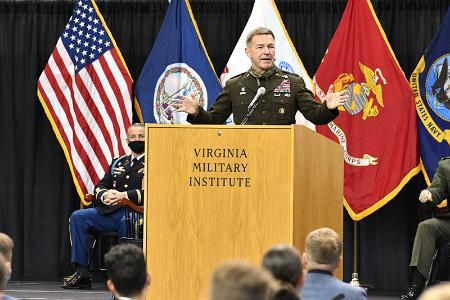2020-2021 | Love Named Chief Diversity Officer at VMI
Army Chief of Staff Stresses People First

Gen. James C. McConville, 40th chief of staff of the U.S. Army – VMI Photo by H. Lockwood McLaughlin
LEXINGTON, Va., Oct. 1, 2020—Gen. James C. McConville, 40th chief of staff of the U.S. Army, addressed faculty, staff, and the Corps of Cadets of Virginia Military Institute in Cameron Hall on Wednesday, Sept. 30. Due to the coronavirus pandemic, this event was closed to the public, and those attending were seated in assigned, socially distanced seats.
McConville, who succeeded Gen. Mark Milley as chief of staff in August 2019, took a conversational tone with cadets, stressing the importance of putting people first and taking care of them as one of the primary ways to become and stay “Army strong.” The chief of staff, a 1981 graduate of the U.S. Military Academy, then allowed approximately 40 minutes for cadet questions.
Immediately after he took the stage, McConville pointed out that the uniform he was wearing, while considered to be the “new” Army uniform, is actually the uniform worn by Army personnel who served in World War II, including Gen. George C. Marshall, VMI Class of 1901. Marshall, McConville noted, was in his current position—Army chief of staff—when World War II began.
“The greatest generation is passing the baton to all of you,” McConville commented. “And you’re going to take the baton and do great things. … Every generation has its heroes.”
Critical to doing great things, McConville stated, is the ability to create cohesive teams in which everyone feels that he or she belongs. “Treat everyone with dignity and respect. Make everyone feel that they are part of the team. … The secret sauce of any organization is that the people care about each other,” he commented.
McConville pointed out that with such a climate, problems such as sexual harassment, suicide, and racism/extremism will be less likely to flourish. “These are three things in the military that I’m going after,” he said. “They break trust, and they harm our soldiers.”
During his speech, McConville shared with cadets several vignettes from his combat tours, including one from when he was with the 1st Cavalry Division in Iraq in 2004. During that time, he recalled, he was flying an Apache helicopter when he was given authority to shoot at a white van whose occupants were allegedly shooting rockets at American soldiers.
McConville spied the van from the air, and began to follow it, but should he order his soldiers to shoot? McConville asked cadets what they would do in that situation—and then related what actually happened. He sped up, flying well ahead of the van so he could see where it was going. Eventually, it stopped, and a family got out.
“It’s a good thing we didn’t shoot,” said McConville. He added that this story illustrates a point he often makes when those in his chain of command say, “Well, I did the right thing.” To this, McConville often replies, “Yes, but did you do the right thing in the right way?”
The longtime officer also talked about how he views taking risks, an inevitable part of life in the military. A risk is only worth it, he commented, if the payoff is commensurate.
Cadet questions for McConville were numerous and wide-ranging. More than one cadet asked the chief of staff about managing mental health in a pandemic, and McConville echoed a theme he’d mentioned during his remarks: that while COVID-19 doesn’t usually pose a grave threat to the physical health of young people, the social distancing aspect of managing the disease can be quite detrimental to their mental health.
Many mental health issues, McConville stated, stem from a sense of not belonging. “You have to look out for those people and take care of them,” he counseled. “Look out for each other. These are tough times.”
Another cadet asked McConville who he’d looked up to when he was a cadet at West Point, and in his reply, McConville didn’t mention any names. “The ones who touched me the most were the ones who could do it all—IQ and EQ,” he said.
There are plenty of smart people with a high IQ, but it’s often EQ, or emotional quotient, that makes the difference, McConville stated.
Another questioner wanted McConville to identify the number one mistake made by junior officers. The chief of staff wasted no time in giving some advice—learn how to fail.
“Go fail right now,” he said. “Fail at something important to you.” McConville pointed out that while his Army biography looks stellar—he served as commanding general of the 101st Airborne Division (air assault) during Operation Enduring Freedom, among many other assignments, and he’s a senior Army aviator qualified in numerous aircraft—there were also a lot of mistakes along the way.
After his remarks, McConville also met privately with Gen. J.H. Binford Peay III '62, superintendent, and toured post before departing. It was the second time in three and a half years that the chief of staff of the Army has visited VMI, as Milley, who is now chairman of the Joint Chiefs of Staff, spoke in Cameron Hall in February 2017.
Mary Price
Communications and Marketing
VIRGINIA MILITARY INSTITUTE
.svg)
.png)